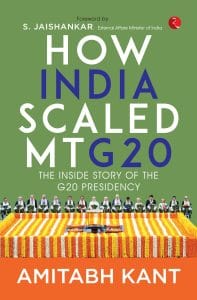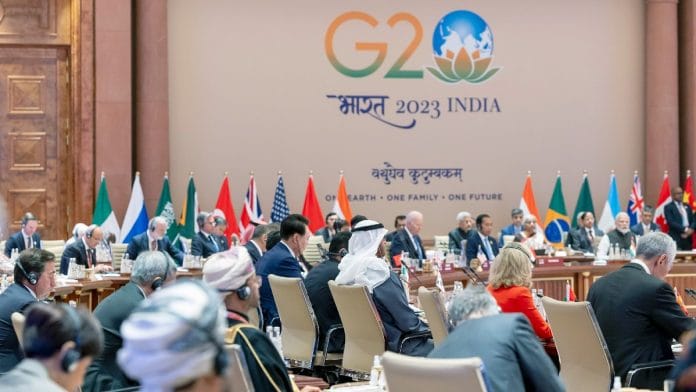We had reached a consensus on all other paragraphs of the Declaration, including contentious positions around climate and energy. But after several relentless days and sleepless nights, during which we had exchanged over 16 drafts of agreed and newly constructed language, we were still at an impasse. The Chola Villa had failed to reach a verdict.
The Final Gambit: ‘Take it or Leave it’
By the afternoon of 8 September, the last Sherpa meeting had officially come to an end, but negotiations hadn’t. The leaders and their delegations had started coming into Delhi, and the Sherpas wanted to brief their leaders. With less than 20 hours to go, we moved negotiations to the headquarters of the G20 Secretariat in Delhi, the Sushma Swaraj Bhawan.
With Brazilian Sherpa Lyrio and South African Sherpa Dangor, and a late inclusion of the Indonesian Sherpa Djani—who had returned from the 18th East Asia Summit in Jakarta—the final draft began to take shape, a draft that would serve as a litmus test for unity.
Just two days before India’s G20 Summit, the ASEAN Summit in Jakarta had failed to achieve consensus on the crucial geopolitical paragraph, revealing significant fractures within this key regional bloc. ASEAN, which comprises ten member nations—Indonesia, Malaysia, the Philippines, Singapore, Thailand, Brunei, Vietnam, Laos, Myanmar and Cambodia—has long prided itself on promoting regional cooperation, consensus-led multilateral governance, and stability. However, the inability to address pressing security challenges, particularly concerning China’s assertiveness and the ongoing crisis in Myanmar, illustrated a troubling decline in regional collaboration.
This failure was particularly striking given the escalating security dynamics in the region. As tensions mounted, the paralysis within ASEAN raised concerns about its effectiveness and relevance, amplifying the struggles we faced in our negotiations for the Delhi Declaration. The inability of ASEAN to respond coherently to such fundamental issues cast deeper doubts on our project to align the interests of the Global South. We needed a unified message more than ever, but each setback in global diplomacy served as a stark reminder of the obstacles we were likely to encounter. Dominoes were falling all around us—if smaller international bodies could not work, what hope did we have for the G20?
The atmosphere in the room was thick with negativity and pessimism. As the night wore on, a prevailing sense of doubt took hold; many believed that India would not be able to reach an agreement by morning. We hadn’t even submitted a written draft until this point, leading to murmurs of frustration. It seemed we had pushed things too far and left the impossible for the end, when energies were spent, and faith in global diplomacy was at an all-time low.
Yet, despite the pervasive pessimism, we carried on with our drafting, determined to shift the narrative in our favour. It was an uphill battle, but as we pressed on, a faint glimmer of hope began to emerge.
At midnight on 9 September, the night before the G20 Summit, we assertively put our words on paper and presented a final written draft for the first time to all the Sherpas present at the Sushma Swaraj Bhawan. The draft was not only ambitious and forward-looking but also designed to address the concerns of all parties involved. Backed by the support of PM Modi, I made our stand clear: this draft was non-negotiable.
This was our final draft:
For the Planet, People, Peace and Prosperity
- We note with deep concern the immense human suffering and the adverse impact of wars and conflicts around the world.
- Concerning the war in Ukraine, while recalling the discussion in Bali, we reiterated our national positions and resolutions adopted at the UN Security Council and the UN General Assembly (A/RES/ES-11/1 and A/RES/ES-11/6) and underscored that all states must act in a manner consistent with the Purposes and Principles of the UN Charter in its entirety. In line with the UN Charter, all states must refrain from the threat or use of force to seek territorial acquisition against the territorial integrity and sovereignty or political independence of any state. The use or threat of use of nuclear weapons is inadmissible.
- Reaffirming that the G20 is the premier forum for international economic cooperation and recognizing that while the G20 is not the platform to resolve geopolitical and security issues, we acknowledge that these issues can have significant consequences for the global economy.
- We highlighted the human suffering and negative added impacts of the war in Ukraine with regard to global food and energy security, supply chains, macro-financial stability, inflation, and growth, which has complicated the policy environment for countries, especially developing and least developed countries which are still recovering from the COVID-19 pandemic and the economic disruption which has derailed progress towards the SDGs. There were different views and assessments of the situation.
- We appreciate the efforts of Türkiye and UN-brokered Istanbul Agreements consisting of the Memorandum of Understanding between the Russian Federation and the Secretariat of the United Nations on Promoting Russian Food Products and Fertilizers to the World Markets and the Initiative on the Safe Transportation of Grain and Foodstuffs from Ukrainian Ports (Black Sea Initiative) and call for their full, timely and effective implementation to ensure the immediate and unimpeded deliveries of grain, foodstuffs, and fertilizers/inputs from the Russian Federation and Ukraine. This is necessary to meet the demand in developing and least developed countries, particularly those in Africa.
- In this context, emphasizing the importance of sustaining food and energy security, we called for the cessation of military destruction or other attacks on relevant infrastructure. We also expressed deep concern about the adverse impact that conflicts have on the security of civilians thereby exacerbating existing socio-economic fragilities and vulnerabilities and hindering an effective humanitarian response.
 This excerpt from Amitabh Kant’s ‘How India Scaled Mt G20: The Inside Story of the G20 Presidency’, has been published with permission from Rupa Publications.
This excerpt from Amitabh Kant’s ‘How India Scaled Mt G20: The Inside Story of the G20 Presidency’, has been published with permission from Rupa Publications.






